Frede Blaabjerg
Physics-Informed Neural Network for Parameter Identification: a Buck Converter Case Study
Apr 29, 2025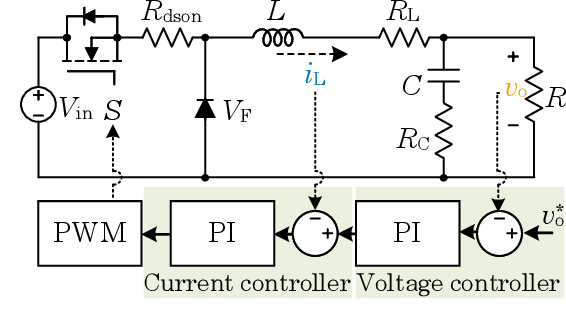
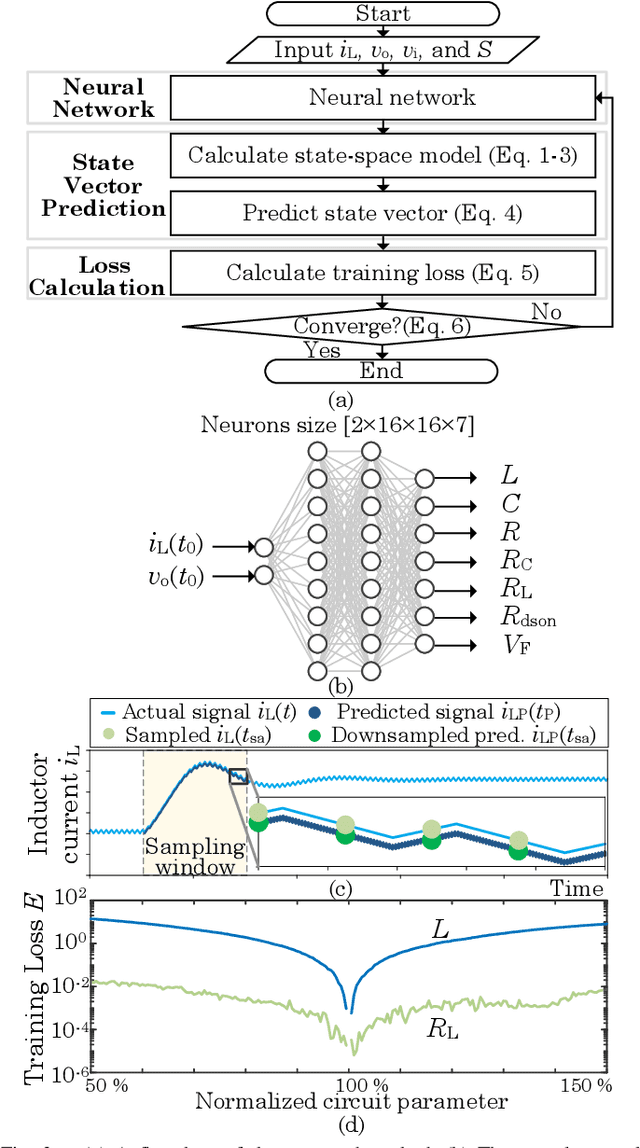
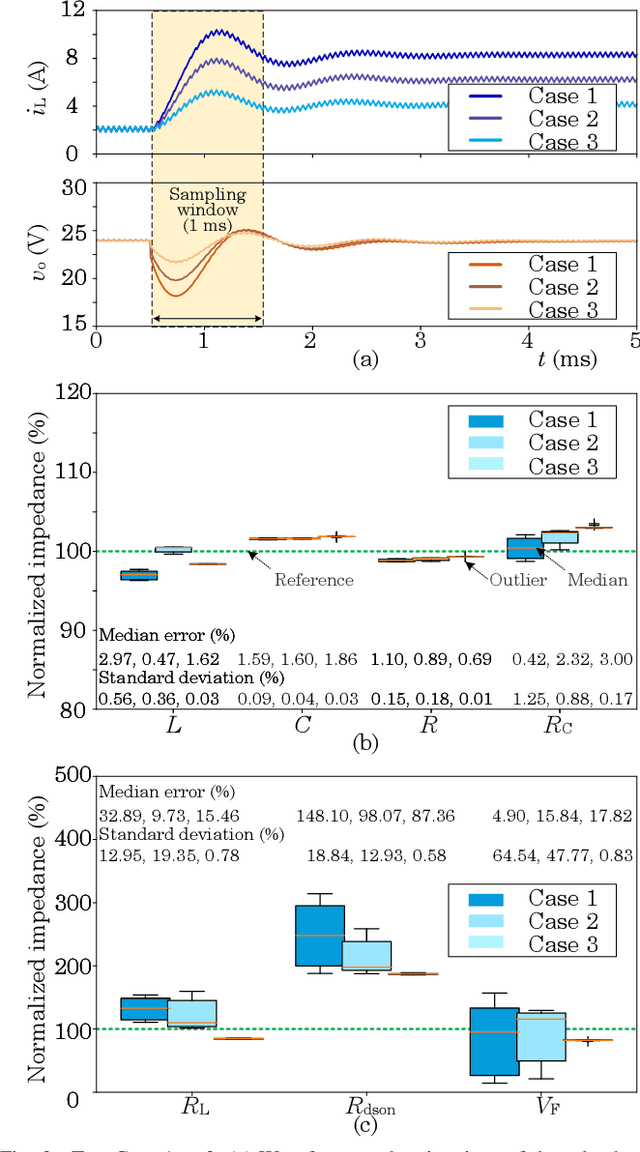
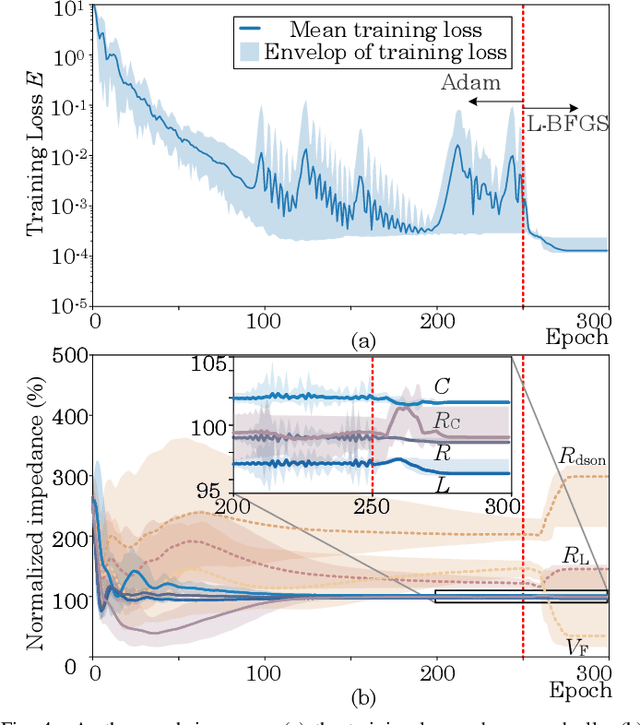
Abstract:System-level condition monitoring methods estimate the electrical parameters of multiple components in a converter to assess their health status. The estimation accuracy and variation can differ significantly across parameters. For instance, inductance estimations are generally more accurate and stable than inductor resistance in a buck converter. However, these performance differences remain to be analyzed with a more systematic approach otherwise the condition monitoring results can be unreliable. Therefore, this paper analyzes the training loss landscape against multiple parameters of a buck converter to provide a systematic explanation of different performances. If the training loss is high and smooth, the estimated circuit parameter typically is accurate and has low variation. Furthermore, a novel physics-informed neural network (PINN) is proposed, offering faster convergence and lower computation requirements compared to an existing PINN method. The proposed method is validated through simulations, where the loss landscape identifies the unreliable parameter estimations, and the PINN can estimate the remaining parameters.
Uncertainty-Aware Artificial Intelligence for Gear Fault Diagnosis in Motor Drives
Dec 02, 2024

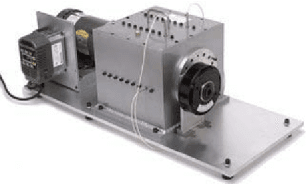
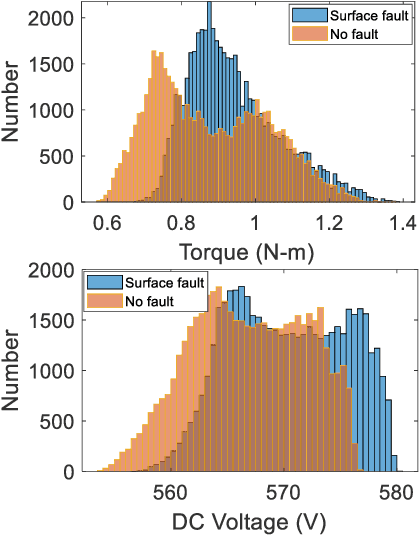
Abstract:This paper introduces a novel approach to quantify the uncertainties in fault diagnosis of motor drives using Bayesian neural networks (BNN). Conventional data-driven approaches used for fault diagnosis often rely on point-estimate neural networks, which merely provide deterministic outputs and fail to capture the uncertainty associated with the inference process. In contrast, BNNs offer a principled framework to model uncertainty by treating network weights as probability distributions rather than fixed values. It offers several advantages: (a) improved robustness to noisy data, (b) enhanced interpretability of model predictions, and (c) the ability to quantify uncertainty in the decision-making processes. To test the robustness of the proposed BNN, it has been tested under a conservative dataset of gear fault data from an experimental prototype of three fault types at first, and is then incrementally trained on new fault classes and datasets to explore its uncertainty quantification features and model interpretability under noisy data and unseen fault scenarios.
A Data-Driven Condition Monitoring Method for Capacitor in Modular Multilevel Converter
Apr 20, 2024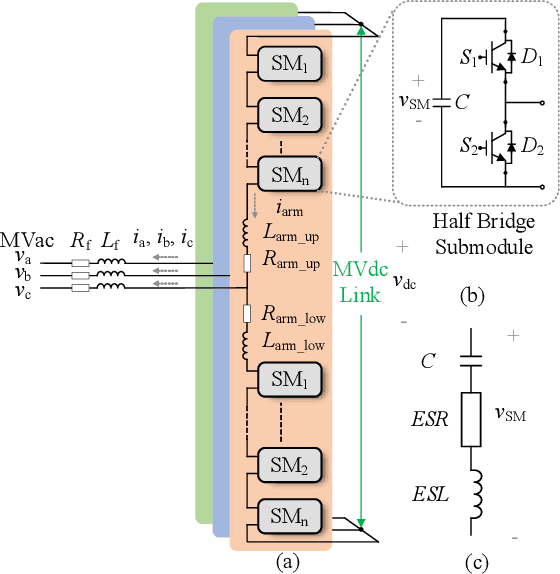
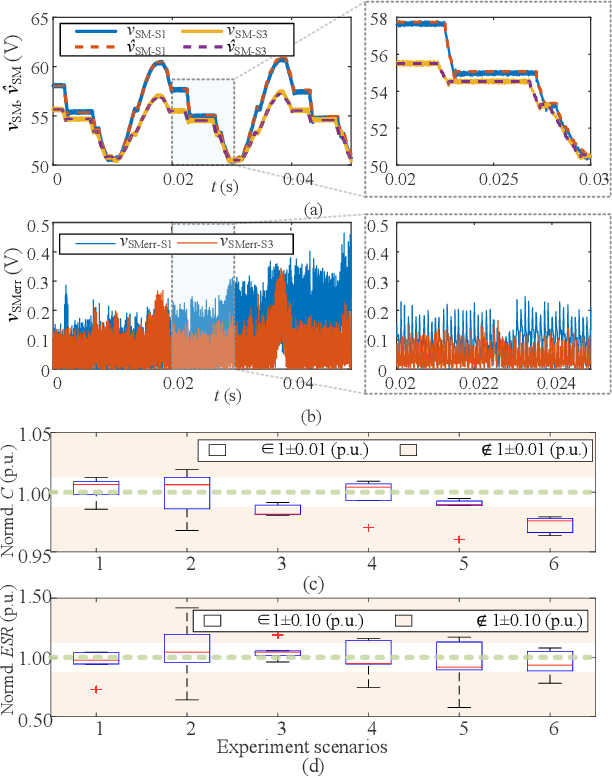
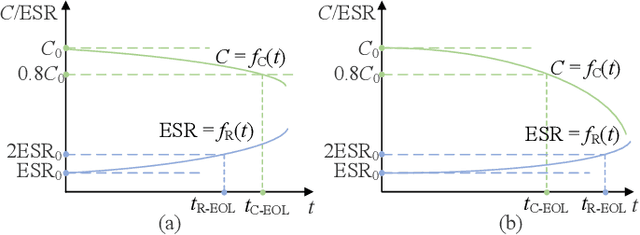
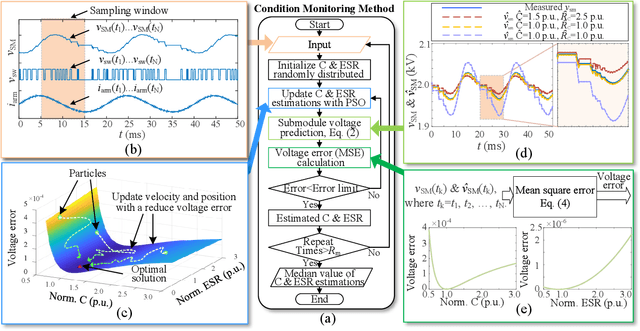
Abstract:The modular multilevel converter (MMC) is a topology that consists of a high number of capacitors, and degradation of capacitors can lead to converter malfunction, limiting the overall system lifetime. Condition monitoring methods can be applied to assess the health status of capacitors and realize predictive maintenance to improve reliability. Current research works for condition monitoring of capacitors in an MMC mainly monitor either capacitance or equivalent series resistance (ESR), while these two health indicators can shift at different speeds and lead to different end-of-life times. Hence, monitoring only one of these parameters may lead to unreliable health status evaluation. This paper proposes a data-driven method to estimate capacitance and ESR at the same time, in which particle swarm optimization (PSO) is leveraged to update the obtained estimations. Then, the results of the estimations are used to predict the sub-module voltage, which is based on a capacitor voltage equation. Furthermore, minimizing the mean square error between the predicted and actual measured voltage makes the estimations closer to the actual values. The effectiveness and feasibility of the proposed method are validated through simulations and experiments.
Data-Driven Stability Assessment of Power Electronic Converters with Multi-Resolution Dynamic Mode Decomposition
Apr 15, 2024



Abstract:Harmonic instability occurs frequently in the power electronic converter system. This paper leverages multi-resolution dynamic mode decomposition (MR-DMD) as a data-driven diagnostic tool for the system stability of power electronic converters, not requiring complex modeling and detailed control information. By combining dynamic mode decomposition (DMD) with the multi-resolution analysis used in wavelet theory, dynamic modes and eigenvalues can be identified at different decomposition levels and time scales with the MR-DMD algorithm, thereby allowing for handling datasets with transient time behaviors, which is not achievable using conventional DMD. Further, the selection criteria for important parameters in MR-DMD are clearly defined through derivation, elucidating the reason for enabling it to extract eigenvalues within different frequency ranges. Finally, the analysis results are verified using the dataset collected from the experimental platform of a low-frequency oscillation scenario in electrified railways featuring a single-phase converter.
Semiconductor Devices Condition Monitoring Using Harmonics in Inverter Control Variables
Apr 15, 2024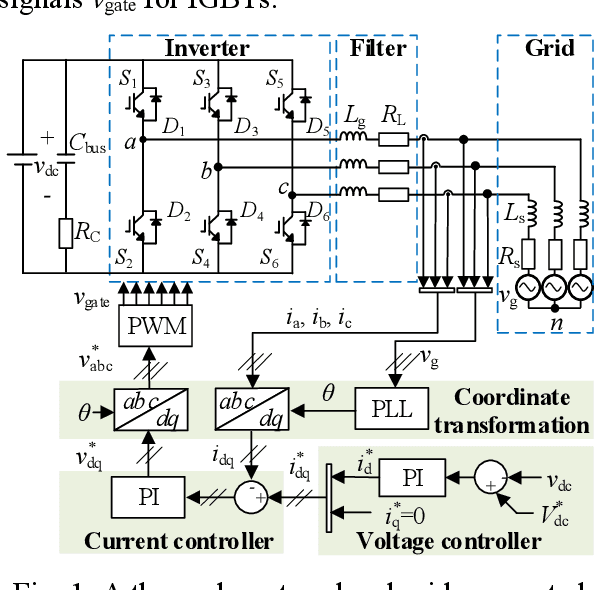
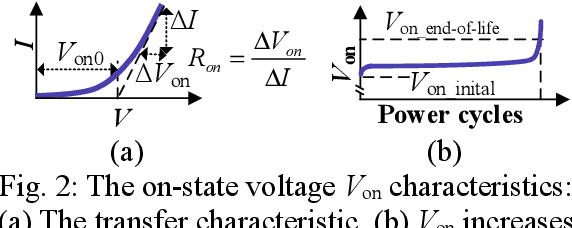
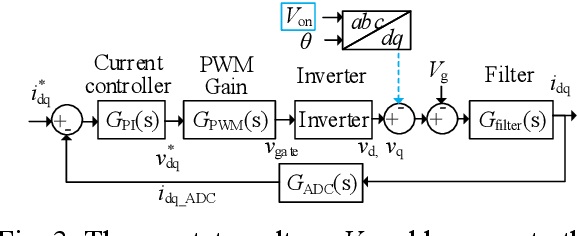
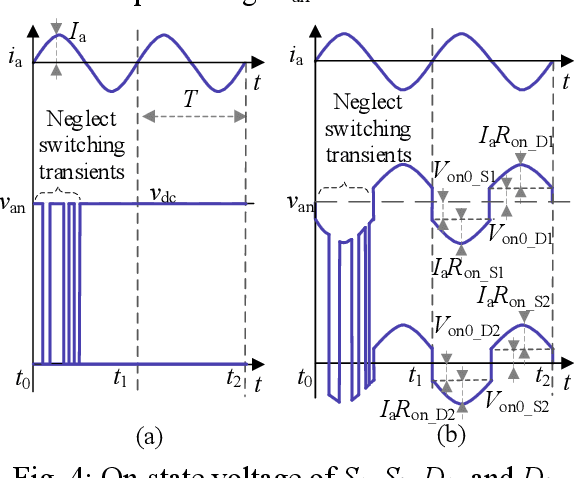
Abstract:The health status of power semiconductor devices in power converters is important but difficult to monitor. This paper analyzes the relationship between harmonics in inverter control variables and a health precursor (the on-state voltage Von of power semiconductor devices). Based on the analysis, harmonics can estimate Von without adding extra sensing circuits. The method is validated through simulations.
A Gray-Box Stability Analysis Mechanism for Power Electronic Converters
Apr 15, 2024Abstract:This paper proposes a gray-box stability analysis mechanism based on data-driven dynamic mode decomposition (DMD) for commercial grid-tied power electronics converters with limited information on its control parameters and topology. By fusing the underlying physical constraints of the state equations into data snapshots, the system dynamic state matrix and input matrix are simultaneously approximated to identify the dominant system dynamic modes and eigenvalues using the DMD with control (DMDc) algorithm. While retaining the advantages of eliminating the need for intrinsic controller information, the proposed gray-box method establishes higher accuracy and interpretable outcomes over the conventional DMD method. Finally, under experimental conditions of a low-frequency oscillation scenario in electrified railways featuring a single-phase converter, the proposed gray-box DMDc is verified to identify the dominant eigenvalues more accurately.
Model-Free Voltage Regulation of Unbalanced Distribution Network Based on Surrogate Model and Deep Reinforcement Learning
Jun 24, 2020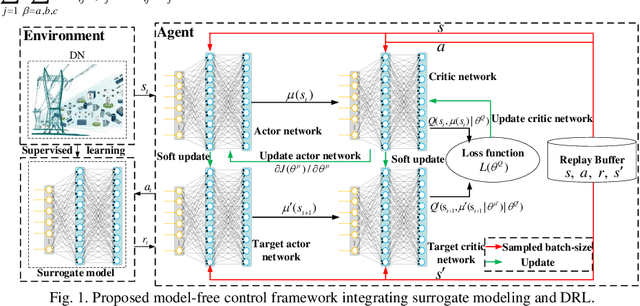

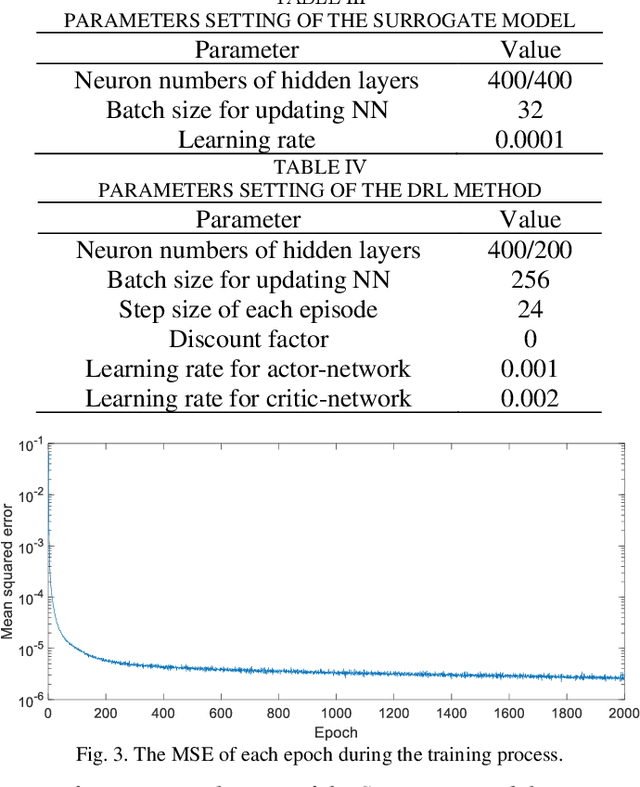
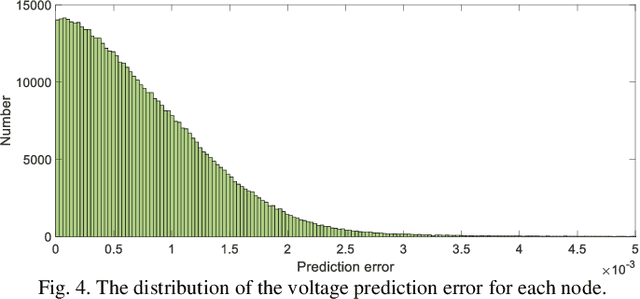
Abstract:Accurate knowledge of the distribution system topology and parameters is required to achieve good voltage controls, but this is difficult to obtain in practice. This paper develops a model-free approach based on the surrogate model and deep reinforcement learning (DRL). We have also extended it to deal with unbalanced three-phase scenarios. The key idea is to learn a surrogate model to capture the relationship between the power injections and voltage fluctuation of each node from historical data instead of using the original inaccurate model affected by errors and uncertainties. This allows us to integrate the DRL with the learned surrogate model. In particular, DRL is applied to learn the optimal control strategy from the experiences obtained by continuous interactions with the surrogate model. The integrated framework contains training three networks, i.e., surrogate model, actor, and critic networks, which fully leverage the strong nonlinear fitting ability of deep learning and DRL for online decision making. Several single-phase approaches have also been extended to deal with three-phase unbalance scenarios and the simulation results on the IEEE 123-bus system show that our proposed method can achieve similar performance as those that use accurate physical models.
 Add to Chrome
Add to Chrome Add to Firefox
Add to Firefox Add to Edge
Add to Edge